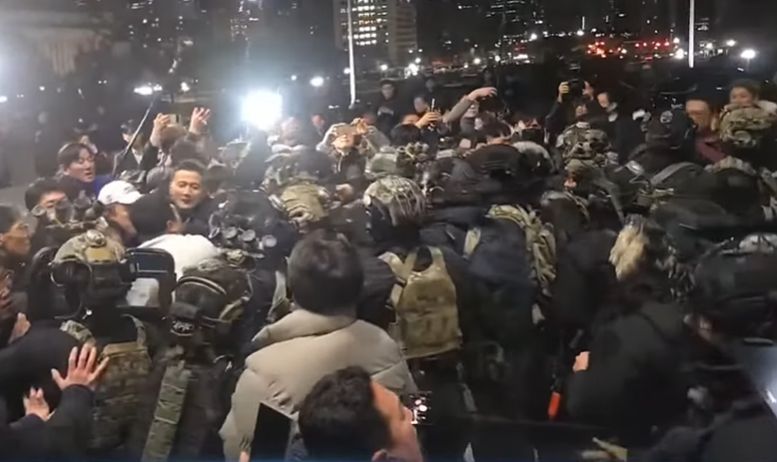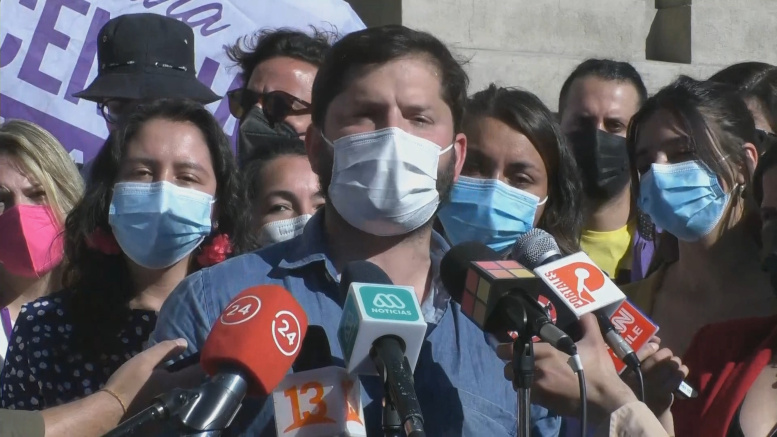Vilgot Karlsson
The state of emergency and the coup attempt were a desperate attempt by an unpopular president. President Yoon Suk Yeol of the People Power Party (PPP) sought to attack his opponents in an ongoing and bitter capitalist power struggle and to disarm a labor movement that was preparing for battle. The state of emergency included, among other things, a sweeping ban on all political activity, including the National Assembly, local councils, associations and political party activities, as well as a ban on demonstrations and strikes. The media was taken over by the military.
After just six hours, the state of emergency was lifted — after 190 opposition politicians entered the National Assembly and bypassed the military’s barricades with the help of spontaneously-gathered crowds. The military was ordered to arrest the leader of Yoon’s own party, Han Dong-hoon, the opposition leader Lee Jae-myung (Democratic Pary of Korea), and the chairman of the Korean Confederation of Trade Unions (KCTU), among others. But the plan was never fully put into action. At the same time, the streets were filled with thousands of protesting people.
The declaration included a separate letter stating that all healthcare personnel, including medical students and interns, who are on strike or have left the profession behind must return to duty within 48 hours and “work faithfully.” The background to this is the ongoing healthcare crisis that escalated in February after the government proposed to raise the admission quota for healthcare students to counteract the acute shortage of personnel.
Thousands of doctors have resigned and medical students have interrupted their education since February because they believe that the government’s proposal does not solve the fundamental problems of why so many leave the job and so few apply to healthcare. Unpaid leave, mandatory overtime, long shifts and low wages are some of the issues raised by the healthcare union when they called for a strike in August. The strike was called off after promises from several hospital managements for higher wages and better schedules.
On November 26, the KCTU, South Korea’s largest independent union, announced a strike on December 5–6 for public transport workers and school catering and cleaning workers, covering approximately 70,000 employees at four workplaces. The main demand was President Yoon’s resignation and for wage increases.
In response to Yoon’s coup attempt, the KCTU then called for strikes until the president resigns or is removed. Among others, tens of thousands of metalworkers at Kia, General Motors and Hyundai have participated in rolling strikes since December 5 (according to the United Electrical, Radio and Machine Workers of America). In particular, the KCTU emphasized the call for National Assembly members of Yoon’s People’s Power Party (PPP) to vote in favor of removing him.
In his declaration, Yoon accused the bourgeois liberal Democratic Party (DPK), which has a majority in the National Assembly, of anti-state activities and collusion with “North Korean communists.” The PPP has been in minority government since the April 2024 parliamentary election, with 108 seats out of a total of 300 in the National Assembly, while its rival DPK has 170.
Yoon won the 2022 presidential election with 48.56 percent of the vote against opponent Lee Jae-myung’s 47.83 percent, the thinnest margin ever of just a few hundred thousand votes. Yoon’s popularity in opinion polls has steadily declined from around 53 percent in 2022 to 17% in November 2024 (Gallup). Since taking office, Yoon has been criticized for several corruption and bribery scandals, the healthcare worker crisis, an undemocratic use of the veto to block opposition bills, and the decision to let South Korean instead of Japanese companies compensate victims of Japan’s forced labor and oppression during World War II (60 percent of the population was against it). Biden’s assistant Secretary of State Campbell proposed Yoon to get the Nobel Peace Prize. Scandalously, South Korea hosted the US “Summit for Democracy” in March 2024, which aims to “renew democracy at home and counter autocratic forces abroad”. Its three stated goals are to strengthen defenses against authoritarianism, fight corruption and promote human rights.
The first attempt to impeach the president on December 7 failed as all PPP members boycotted the vote while Han Dong-hoon claimed as an alternative that Yoon had agreed to a phased “orderly exit”. On December 10, it was decided to open an investigation into treason against Yoon. On December 14, 204 members voted in favor and 85 against to impeach Yoon.
It is important to emphasize that the main force that defeated Yoon’s coup is not the opposition in parliament but the workers’ struggle and mass demonstrations, and only if this movement is developed more fully and moves into the driving seat, will the threat of new right-wing and anti-democratic maneuvers be overcome. The DPK and the PPP are both capitalist, conservative parties with a history of anti-union, anti-LGBTQ+ and anti-feminist policies. The union leadership’s prioritization of political courtship and parliamentary solutions to the political crisis weakens rather than strengthens the anti-Yoon struggle. Instead, mass grassroots committees need to be built to organise for widespread general strikes in all sectors, in defense of democratic rights, for higher wages and better working conditions, for abortion rights and equal pay, and against privatization, militarization and reactionary policies.
The need for workers’ independent political organization is urgent, and the unions should take the lead in building a workers’ party that sets itself the task of uniting the masses in a struggle for a socialist alternative.




